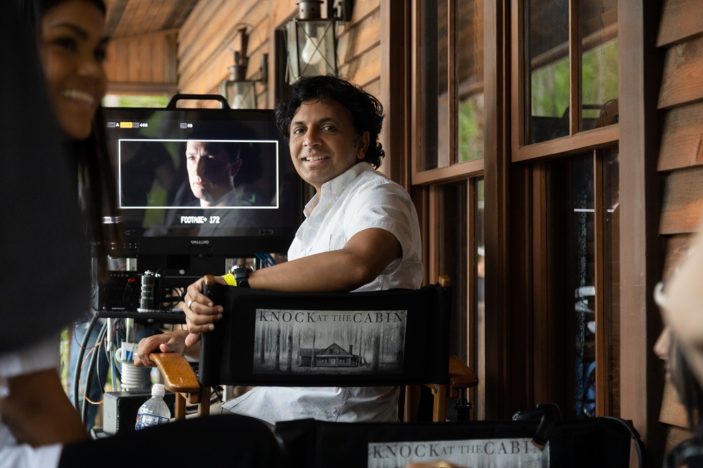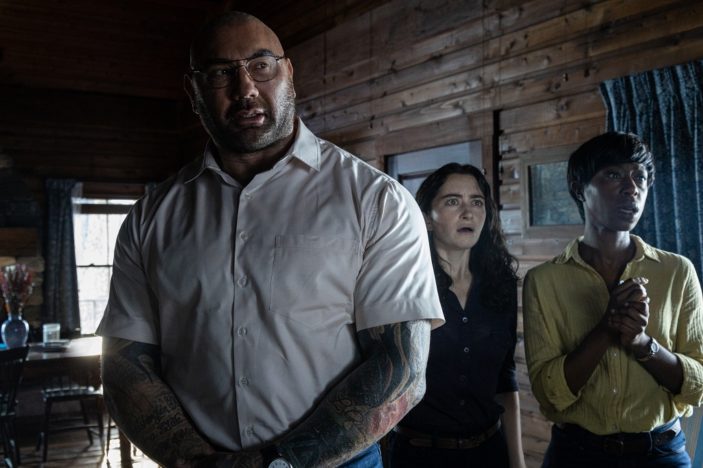
Based on Paul G. Tremblay’s acclaimed 2018 novel “The Cabin at the End of the World”, Knock at the Cabin is the latest white-knuckle thriller from genre maestro M. Night Shyamalan.
While vacationing at a remote cabin, a young girl and her parents are taken hostage by four armed strangers who demand that the family make an unthinkable choice to avert the apocalypse. With limited access to the outside world, the family must decide what they believe before all is lost.
As the film braces for theatres across the world, Peter Gray spoke with Shyamalan about the personal emotionality behind such a harrowing story, if he feels pressure in adapting someone else’s work, and the moment he knew he had to cast Dave Bautista.
Given the central couple are same-sex, was it imperative to you to cast queer actors to complete that authenticity?
My hopes were that I would find actors that were openly gay. I don’t know what I would have done if I felt like I didn’t find just the right actors. Luckily, I found Jonathan (Groff) and Ben (Aldridge) who are the perfect couple. It’s such a beautiful premise when you get to into the plot of the movie, that you have this family who aren’t blood related. It’s kind of just a beautiful, poetic kind of makeup for a family, given the plot.
The characters are so intricately designed. Do you take any of your own experiences when informing them?
I guess the part that was very personal to me was the adoption of the child (as) my youngest daughter is adopted. When I think about what I feel for her and what my wife and I feel for her… the orphanage that I showed in the film is built off the one that we went to to pick her up. We were waiting in the lobby and we were looking at this mural of Jesus with all these white children, and I brought that feeling of what you see when the boys pick her up for the first time. In that way it’s very much our family story.
And this story is an adaptation, and I heard you say that this was the fastest script you ever wrote. Do you find a different approach in writing a script adapted from another medium? Is there pressure in changing certain narrative strands of the original novel?
There’s a great advantage because you have a premise and sometimes a lot of characters that are there for you to build off of. So you have momentum. And I definitely had that with this movie. Paul (G. Tremblay, author of “The Cabin at the End of the World”) had a beautiful setup that I just kept riding with and started moving down the road. No, I feel no compunction about changing the book, because I changed the title. This is not an adaptation of that book. This is inspired by. I don’t feel that worry about that. I think it’s kind of an interesting exercise if people want to see what the original author did with the premise, versus what I did for the movie. They’re both different mediums, too, so it was an interesting exercise. The cool thing is I told Paul what I was going to do with the movie, and he tells me that (my idea) was the first thing he was going to do. So, I felt good about that.

Was there any inspiration behind cast Dave Bautista?
You know, sometimes I see an actor in a movie, and I’ll see a weird, little moment. Sometimes it’s obvious to others. Sometimes it’s not. But, to me, there’s something they’re doing that’s absolutely exceptional. When I saw Philip Seymour Hoffman in Boogie Nights, I thought “Wow, we’re looking at one of the great actors to come.” I remember seeing Bradley Cooper in a tiny rom com and I thought the same thing. In this case (with Dave) it was Blade Runner 2049. There was a scene, and it was a very nonverbal scene, and I was watching how this actor was emanating through their body. A purity of thought process. I didn’t know, at that point, that he was a wrestler. I just knew I was watching somebody that was at inflection point in their lives.
Religion can so often be villainised in film. What role does religion play in your thinking?
I went to Catholic school for 10 years. The whole thing with nuns and everything. My parents are Hindu (and) I think I approach religion as mythology. I’m not religious. I’m very, very… you could describe me as very spiritual. I’m fascinated by it though as a mythology that people think about and want to be true. When I think about mythologies about other things, (like) aliens and ghosts, it has the same kind of wish fulfilment for me (and) for the characters, and imagining what a real world version of a biblical element would be. It’s fun to me. In this case, for example, these people that break in are just not equipped to do this. And I find that uncomfortable funny. One of the things I thought was really interesting was that the premise of the movie kind of says, “Hey, there may be a God, but we’re getting the details wrong here.”
Knock at the Cabin is screening in Australian theatres from February 2nd, 2023.
